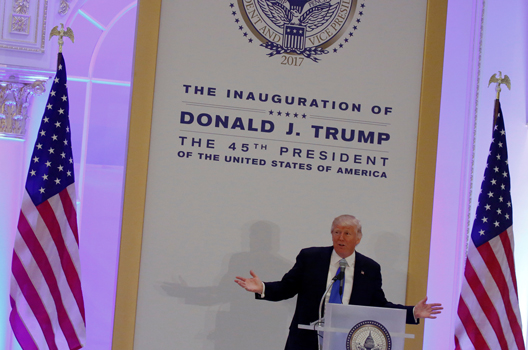 Though inauguration speeches are not known for their foreign policy pronouncements, the world’s complexity demands that US President-elect Donald J. Trump mention foreign policy in his address to the nation during his inauguration on January 20. In 1905, Theodore Roosevelt used his speech to describe how the United States could continue on the path to becoming a global power. In his inaugural address in 2009, Barack Obama talked about getting out of Iraq, denuclearization, and working with authoritarians who would “unclench” their hold on power. Otherwise, that speech is known more for its call to heal social and political divides in the United States.
Though inauguration speeches are not known for their foreign policy pronouncements, the world’s complexity demands that US President-elect Donald J. Trump mention foreign policy in his address to the nation during his inauguration on January 20. In 1905, Theodore Roosevelt used his speech to describe how the United States could continue on the path to becoming a global power. In his inaugural address in 2009, Barack Obama talked about getting out of Iraq, denuclearization, and working with authoritarians who would “unclench” their hold on power. Otherwise, that speech is known more for its call to heal social and political divides in the United States.
No doubt Trump will attempt to strike a similar message on January 20 using “Reagan’s style and Kennedy’s vision.” Though it is hard to predict what Trump and his inaugural speechwriter, Stephen Miller, are drafting (and revising, and editing, and re-revising…) with regard to US foreign policy, common threads abound in Trump’s worldview, as a result at least some thematic projections can be made.
First, Trump will reiterate his “America First” case. This one seems like a no-brainer. On April 27, 2016, Trump gave a speech at the Center for the National Interest outlining his view that, essentially, the United States does not benefit as it should from the liberal international order. Instead, in Trump’s view, the United States must change the way world works in order to improve America’s overall standing. This means changing current trade deals like the North American Free Trade Agreement (NAFTA), a process already underway. This means abiding by a “peace through strength” model for our military. This means attempting to keep certain jobs in the United States that may have gone elsewhere. Finally, it means returning the United States to a foreign policy agenda focused on taking care of itself instead of “world order.” Though incoming national security advisor, retired LTG Michael Flynn, called the United States the “indispensable” nation, harkening back to the Clinton years, Trump’s commentary thus far does not reflect that view.
Second, Trump will inherently make a case for American unilateralism. This has been a consistent subtext in Trump’s foreign policy pronouncements throughout his campaign and pre-presidency. Indeed, instead of the “America First” tagline, Trump is inherently pursuing an “America Alone” approach. In essence, Trump is distrustful of allies. Pointing to Europe, and NATO specifically, Trump claims allies have not paid enough to protect themselves, and so the United States should not be forced to do so. Regarding Asia, Trump would prefer that countries like Japan or South Korea acquire their own nuclear weapons instead of depending on Washington to protect them. In fact, Trump’s foreign policy views do not greatly differ from those of Ross Perot, although he would not himself make that comparison. Where Obama wanted to work with other countries—almost to a fault, sometimes—Trump has no patience for the (in)action of other states. If Trump thinks America should do it, he will ask her to do it, alone if necessary.
Third, terrorism is the biggest threat Trump will name. On Trump’s official website, he has a section entitled “Foreign Policy and Defeating ISIS.” In other words, defeating the Islamic State of Iraq and al-Sham (ISIS) is the top foreign policy issue on Trump’s mind, and his inauguration speech will likely address how he plans to defeat them “quickly.” Terrorism writ large has become such a focus for Trump that he is asking the State Department to change the way it operates to focus on terrorism. Flynn also believes that ISIS is “dead set on taking us over and drinking our blood.” Safe to say, then, that fighting ISIS and other extremist groups will be the main issue in Trump’s foreign policy. Expect it to be a major theme in the speech.
Finally, the themes will mirror Obama’s foreign policy, except two BIG items. Ideologically, Trump and Obama are far apart. On foreign policy, though, they have important similarities. For starters, they are skeptical of US foreign intervention. They are wary of helping allies and partners in all instances. They also believe economics should be more central to the conduct of foreign affairs. However, there will be a big change in the way Trump deals with Russia and China. Where Obama took a harder stance on Russia and built a relationship with China, Trump wants to be more friendly with Moscow and call out Beijing for currency manipulation and taking advantage of the United States on trade. No doubt in his inaugural address Trump will defend his more lenient views on Russia and justify antagonizing a growing power.
Trump’s short speech will probably mirror the mix of dread and optimism from his nomination acceptance speech in the summer. Both abroad and at home, Trump believes only he can fix the problems that afflict us all. Starting January 20, he will have the chance to prove that to all of us. A great inauguration speech—and foreign policy vision—is a good place to start.
Alex Ward is an associate director at the Brent Scowcroft Center on International Security. You can follow him on Twitter @alexwardb.
Image: US President-elect Donald Trump spoke at a luncheon with his cabinet members and congressional leaders at Trump International Hotel in Washington on January 19. (Reuters/Jonathan Ernst)
